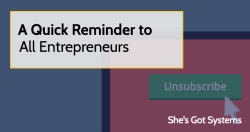I’m fairly certain that the grocery store I frequent thinks that I am on the verge of scurvy. Not that those who work there pay attention that closely, but their marketing software does. Every time I make a purchase it’s tracked and as a result of my shopping habits, coupons print with my receipts.
What my grocery store software doesn’t take into account is that I drive 15 minutes down the road to a local co-op to purchase all my fresh fruits and vegetables.
So it’s somewhat obnoxious when targeted ads for products or service you already purchase keep coming up (whether at the grocery store or online), because I don’t need to buy apples. The store simply needs better produce and more competitive pricing!
But here’s the thing, I see this happening in online business’ marketing all the time.
It seems that the more information we collect about leads, the more is assumed.
Such as the coach who insists “without support you’re struggling unnecessarily to get clients” – when it’s entirely possible that person does have support, just not in a coaching relationship with you.
It also shows up from the app developer or group program coordinator who insists this is what you need for your business, possibly without ever meeting you.
It’s a little like my grocer, assuming that if I don’t buy greens from them then I never eat them.
Sidenote: it’s also why I bought the extraneous lettuce – to cease the endless coupons for overpriced produce.
This puts us in a nice little catch-22, because while it’s good to understand your audience, a little information doesn’t make you all-knowing.
How should we approach sales as marketers?
1. Suggest, don’t demand. It’s so rare that you know the whole story and presumption makes one seem egotistical. Try more if/then statements, such as “if you’re struggling with x, here’s why y may be the solution you’re looking for.”
2. Get to know your leads more. Ask people what they’re interested in. Ask about their struggles. It’s a rather egotistical assumption that everyone needs your book, app, support, shoes, etc.
3. Listen for feedback. Don’t just shrug and say “they’re not evolved enough to know they need me” or some other self-serving b.s. Ask why and when and if and get the full story. Not just one that feeds your ego.
Here’s an easy example using my Frustrated to Freedom Program:
Bad assumptions: if you don’t buy my program it’s because you’re a lazy entrepreneur who doesn’t care about his/her business. Buy now to prove you’re serious about being a winner.
Thoughtful assumptions: if you’re having trouble training an assistant because you don’t know what to communicate how you do what you do, click here to learn more about an easy to build operations manual that can change your business.

 How to finish marketing content
How to finish marketing content Systems for Blogging Consistently
Systems for Blogging Consistently A Quick Reminder to All Entrepreneurs
A Quick Reminder to All Entrepreneurs